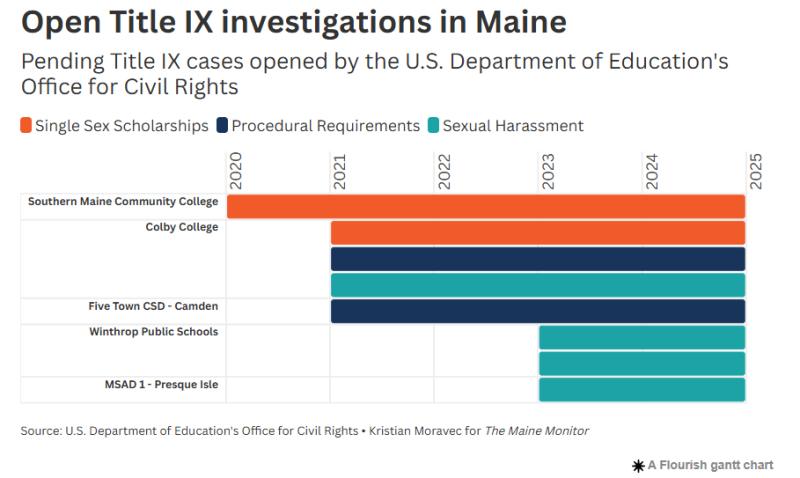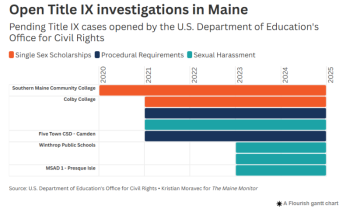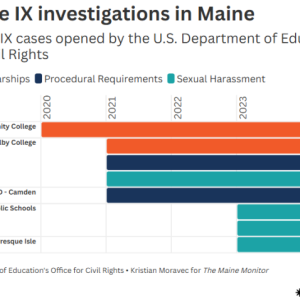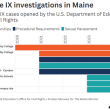Maine’s battle with Trump over Title IX could have national consequences
As Maine’s battle with the Trump administration over transgender student athletes intensifies and enters the courts, legal experts say the consequences could be huge — and extend far beyond Maine.
What started as a politically charged exchange of words between Governor Janet Mills and President Donald Trump in February has mushroomed into several overlapping investigations, threats to pull millions in federal funds and, as of last week, two lawsuits — with Maine suing the U.S. Department of Agriculture and the Trump administration suing the Maine Department of Education.
At issue is a disagreement over whether the state’s policy of allowing transgender students to play on the team that matches their gender identity violates Title IX, a federal law that prohibits sex-based discrimination in education.
The Trump administration alleges that Maine is discriminating against women by allowing transgender students to compete in girls’ sports, while the state claims it is following both federal law and its human rights code, which prohibits discrimination based on gender identity.
Legal experts say it’s hard to predict how the cases will unfold — not only because the questions at play are complex, but because the way the Trump administration has enforced its stance on Title IX is out of the ordinary.
While transgender student policies are the flashpoint at the center of the cultural debate, experts say the cases also raise broader questions about the power of executive orders and what happens when they contradict state law.
“This dispute is really about states’ rights and federalism and how far the president’s powers go with an executive order,” said Kim Pacelli, an education attorney at TNG Consulting, which houses the Association of Title IX Administrators. “So we’ve got two laws in conflict with each other. Which one wins?”
A matter of procedure
The way the Trump administration has approached the Title IX probes in Maine has been unusual, legal experts told The Maine Monitor, citing both the speed and lack of procedure.
Title IX is a 1972 civil rights statute that prohibits discrimination on the basis of sex in schools and education programs that get federal funding. Typically, investigations into whether schools are violating the statute are prompted by complaints to the U.S. Department of Education’s Office for Civil Rights, and they can last from months to years.
The Trump administration’s investigation into Maine, however, was opened and closed within days, and did not involve interviews with state officials.
Per Title IX statute, there is a series of steps a federal agency must take before pulling funding, such as holding a hearing after an investigation.
In Maine’s lawsuit against the USDA, Maine Attorney General Aaron Frey argued in a request for a restraining order that the federal agency did not follow the required process. On April 11, a federal judge granted the request, preventing the USDA from interfering with funding without following procedure and ordering the agency to reinstate funds.
In the vast majority of cases, Title IX investigations are resolved with a voluntary agreement between all parties. Cases can take years to process, and resolutions often result in schools changing policies or retraining staff. In some situations, schools are monitored by the federal government for a period of time after a resolution is reached.
The U.S. Department of Education’s Office for Civil Rights currently has 31 open investigations in Maine education institutions, eight of which are related to Title IX. The oldest open case goes back to 2020, while a majority of cases still pending were opened in 2022. Outside of Maine, some states have cases that date back to 2007.
Legal experts said the speed of the recent Title IX investigations in Maine was abnormal, and the state has argued this indicates they were a sham.
“We have been subject to politically motivated investigations that opened and closed without discussion, leaving little doubt that their outcomes were predetermined,” Mills said in a statement on April 16, after the Trump administration announced it was suing Maine. “Let today serve as warning to all states: Maine might be among the first to draw the ire of the Federal government in this way, but we will not be the last.”
Mills also reiterated an argument she has been making since the investigations opened, which is that the debate is not about protecting women or transgender students but about states’ rights and federal overreach.
“This is not just about who can compete on the athletic field, this is about whether a President can force compliance with his will, without regard for the rule of law that governs our nation. I believe he cannot,” Mills said in the statement.
With the battle moving to the courts, Maine’s case could have an impact on Title IX cases and transgender student policies across the country.
“Most people don’t fight this fight, but in this case the principles are really strongly felt on both sides, is what it looks like,” said Melissa Carleton, an Ohio-based education attorney and consultant.
There’s a chance the case could end up in the Supreme Court, she said, and the ultimate outcome is an open question.
“That’s a ‘who are we as Americans, and what is the state of our country’ question,” Carleton said.
An issue for the courts
The Trump administration and its supporters say their position on the issue is supported by the law and by public opinion. Two-thirds of Americans support policies that require transgender athletes to play on sports teams that match their sex assigned at birth, according to the Pew Research Center.
Trump’s executive orders aim to limit who can participate in women’s sports and establish two federally recognized sexes, male and female — dismissing what it calls “gender ideology extremism.”
The order discounts scientific research, supported by the American Medical Association, that gender identity exists on a spectrum, and it relies on an understanding of sex differentiation at conception, which scientists have said does not take place at that stage of fetal development.
In the past five years, the pendulum on transgender student rights has swung widely.
Courts around the country have dealt with questions around transgender student rights in different settings, but without uniform rulings, Pacelli said, noting that the conversation happening is complex.
“The President’s executive order really doesn’t acknowledge all of that — that this is an issue the courts have already been grappling with,” she said.
One case that several legal experts referenced is Bostock v. Clayton County. The 2020 Supreme Court case ruled that discrimination on the basis of sexual orientation or gender identity is also sex-based discrimination, which is prohibited by Title VII, a civil rights law that prohibits discrimination in employment. Under the first Trump administration, however, interpretations of this case did not interpret the meaning of sex in Title IX to include gender identity.
Another case they pointed to was Soule et al. v. Connecticut Association of Schools, et al., which challenged a trans-inclusive policy in a track and field conference. In the case, the cisgender female athletes who filed the suit alleged that the policy took away their chance to fairly compete and win, violating their Title IX rights. The case was dismissed in 2021, but then revived in 2023.
In 2024, the Biden administration expanded Title IX rules to prohibit discrimination on the basis of gender identity. The administration also proposed a rule to stop schools from banning transgender athletes from participating in teams that match their gender identities, though it was ultimately abandoned.
Upheaval over transgender students in schools is not new — even in Maine. One well-known Maine Supreme Judicial Court case, Doe v. Regional School Unit 26, ruled in 2014 that schools could not deny transgender students access to bathrooms that aligned with their gender identity.
As the legal challenges proceed through the courts, communities across Maine are reacting to the debate in their own ways: some with rallies in support of transgender students, and others with policy changes that align with the Trump administration’s views.
Last week, a school district in Aroostook County adopted a policy that appears to prevent transgender students from using bathrooms or locker rooms aligned with their gender identity, seemingly subverting Maine human rights law.
U.S. Attorney General Pam Bondi said on Wednesday that the district would be exempt from the federal lawsuit.
“I think that was very brave and bold of that school board,” Bondi said.
Frey told WGME on Friday that the school district’s decision puts them at risk legally, and emphasized the state’s plan to fight for its interpretation of Title IX.
“While I understand there may be some risks to litigating, while I understand there may be some money that we have to be worried about, my job is to follow the law,” Frey said. “There is no price that I’m going to put on the attempt to discriminate by the administration.”
This story was originally published by The Maine Monitor, a nonprofit civic news organization. To get regular coverage from The Monitor, sign up for a free Monitor newsletter here.




























